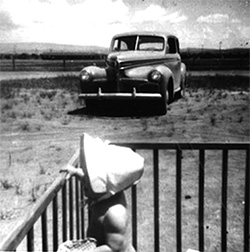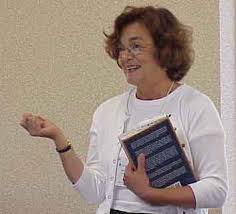Marnie Mueller (Ecuador) — Her Early Life Interned As A Child

Marnie as a baby in the Tule Lake Camp
Marnie Mueller (Ecuador 1963–65) was born in the Tule Lake Japanese American Segregation Camp in northern California where her Caucasian parents went to work to try to make an intolerable situation tolerable for the people imprisoned there. Her father, a pacifist and an economist, active in the progressive Co-operative Movement, was responsible for working with the internees — Nisei, Kibei, and Issei — to set up the camp wide member operated co-op store system; her mother signed on to teach in the camp schools.
“My parents had gone there by choice to try to help people who were incarcerated. And while they worked, I was lovingly cared for by an Issei husband and wife. This is not to say that there weren’t difficult personal repercussions on me and my family, but it’s taking me an entire book to try to come to terms with it.”
Marnie is the author of, among other books, The Climate of the Country, a novel that tells the tragic and dramatic story of Tule Lake Japanese American Segregation Camp during World War II.
Because of the recent situation on our southern border, Marnie has put up a series of tweets. “One of which,” she writes, “has gott en close to a thousand hits. It’s a quote from a Nisei man in Tule Lake, who worked with my father. It speaks to the long life of the memory of trauma even for adults.
en close to a thousand hits. It’s a quote from a Nisei man in Tule Lake, who worked with my father. It speaks to the long life of the memory of trauma even for adults.
“The sight of hundreds of people lined up to board the buses with rifle-bearing soldiers standing guard over us, is still imprinted in my memory (60 years later), with an acute sense of embitterment, humiliation, depression and concern . . .” — Nisei graduate student, 1942
She has also been giving talks entitled “The Color of Citizenship: A Cautionary Tale,” comparing the internment of Japanese Americans to the current anti-immigrant and rising xenophobia in America.
•
In 1963 Mueller joined the Peace Corps, reporting for duty on the very day that President Kennedy was assassinated. She spent two years in Guayaquil, Ecuador living and working in an urban barrio.
•
 The Climate of the Country
The Climate of the Country
by Marnie Mueller (Ecuador 1963–1965)
Curbstone Books
1999
305 pages
$24.95 (hardcover)
Thank you.
Thank you for addressing this evil, Marnie. As Americans, we should hang our heads in shame.
My mother’s dear friend, Catherine Embree Harris, wrote her memoir about teaching in the camp in Poston, Arizona. Dusty Exile: Looking Back at Japanese Relocation During World War II, takes a look at life in a camp created by FDRs Executive Order No. 9066. I was raised knowing about these camps. Most of my mother’s teaching colleagues in Hawaii were of Japanese descent. One friend in particular, Pearl Yamashita, made it a point to take each of her grandchildren on trips to all the camps on the Mainland. (Hawaii, with one exception, declined to participate in the internments, largely because Japanese-Americans living there were too much a part of the social and economic fabric to just rip out.) She wanted them to never forget. Pearl Yamashita, a splendid educator, passed her feisty spirit on to her children, one of whom—Bruce—sued the Marine Corps for discrimination. And won. Eventually.
Catherine and Pearl are long gone. I miss them both. Luckily, Marnie is here to keep this story of a national disgrace in the national consciousness.
Please elaborate on what it means to write that she was “interned as a child.”
Marnie wasn’t interned. She was actually born in the camp and her parents lived in the camp. Just a headline. John
Just a headline? Really, John?!